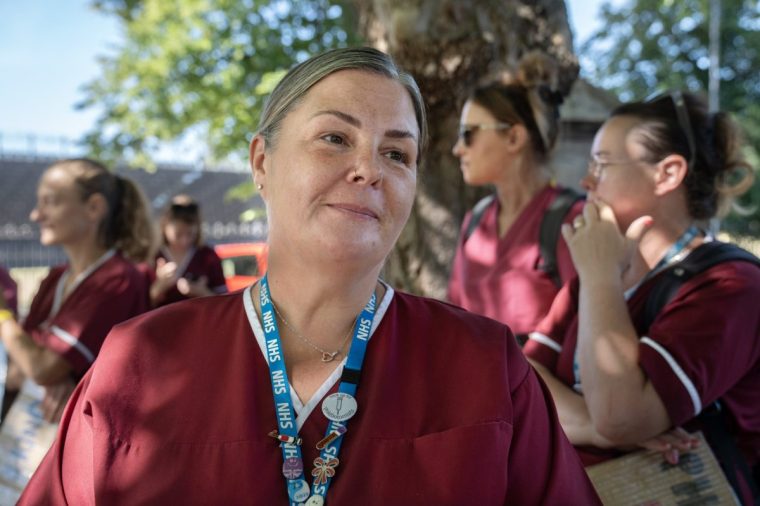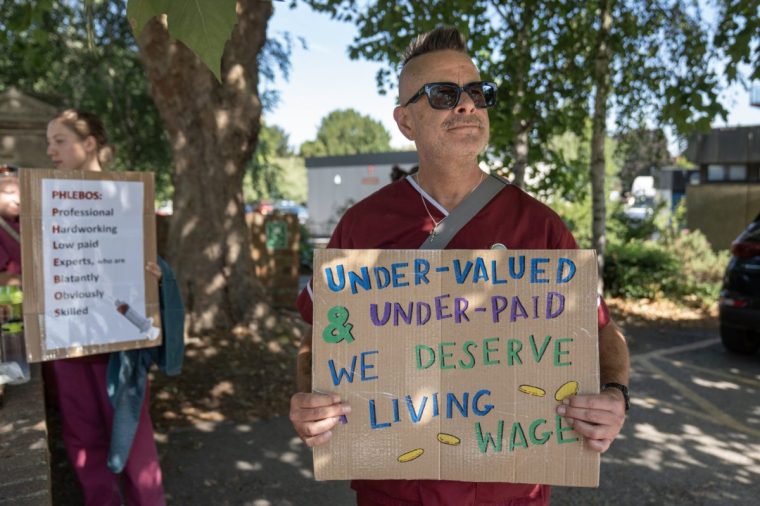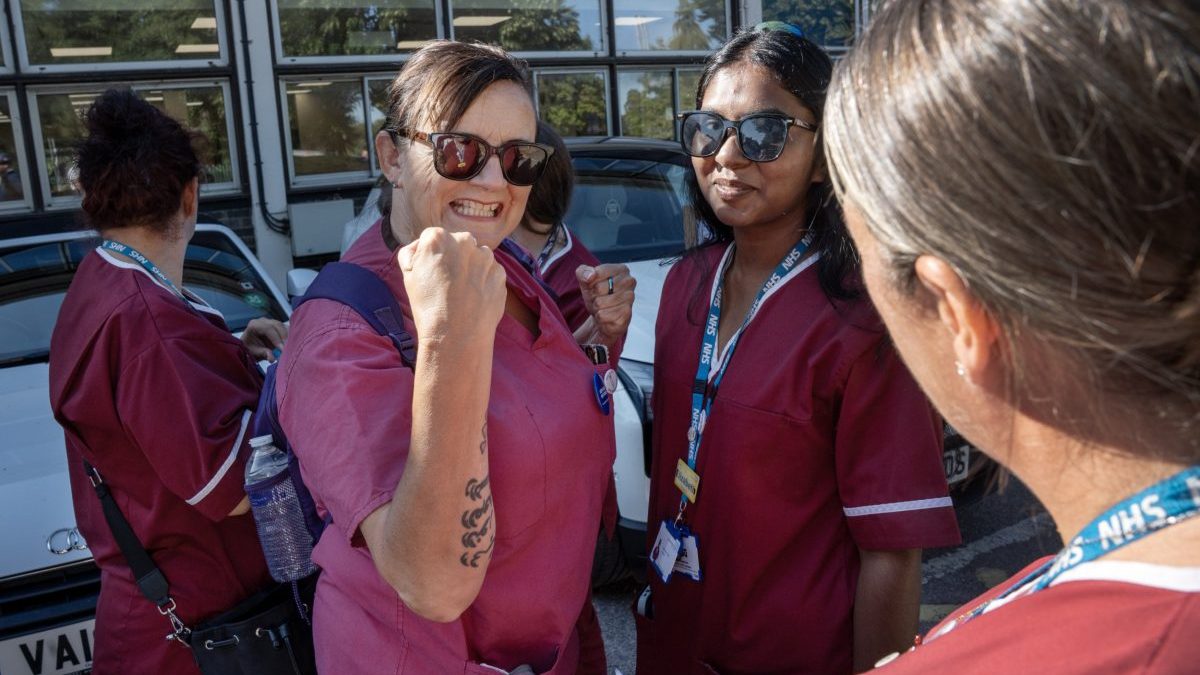A group of phlebotomists has been dubbed ‘The Magnificent Thirty-Seven’ after refusing to back down in the increasingly bitter stand-off with management at Gloucestershire Royal Hospital and Cheltenham General Hospital
An NHS trust stands accused of treating some of its lowest paid staff with contempt after denying them an extra £1 per hour in line with neighbouring hospitals.
A group of phlebotomists has been dubbed “The Magnificent Thirty-Seven” after refusing to back down in the increasingly bitter stand-off with management at Gloucestershire Royal Hospital and Cheltenham General Hospital.
The phlebotomists, healthcare professionals who take blood samples from patients to quickly diagnose diseases and conditions, have pent 107 days on strike making the industrial dispute one of the longest in NHS history.
The row centres around whether a national campaign to move healthcare support workers from band 2 to band 3 on the NHS pay scale should include phlebotomists. The Gloucestershire phlebotomists are currently band 2 and paid up to £12.51 an hour – 30p above the national minimum wage.
They argue that their knowledge, skills and training equate to those of a band 3 worker whose top tier is £13.60 – a £1.09 difference. The phlebotomists want to be regraded and given back pay to cover the extra duties they have been doing for years.
‘We want recognition’
Caroline Hayhurst, a former paramedic of 30 years who has been a phlebotomist at the trust for the last 10 years, said: “There are a number of trusts where staff are band 2 and the phlebotomy role does vary from trust to trust, but a lot of people are band 3 already and a lot of trusts have moved staff to band 3 on the back of our dispute. We know our skills align with band 3 and we want recognition of that.
“Ours is a very modest and justifiable claim. The patients are the ones that are inconvenienced the most yet they are telling us to stand our ground.”
The phlebotomists first raised concerns over their pay in February 2024 and submitted a formal complaint last September. Since then, they have accused the trust of ignoring a fair job-evaluation process and of attempting to avoid its obligation to properly assess their skills and responsibilities. The trust refutes the allegations.
The i Paper joined the phlebotomists as they attended the trust’s monthly public board meeting last Friday before returning to the picket line. After laying out the group’s concerns again, and to cheers from her colleagues, phlebotomist Kelly Carter asked the board: “Why are you continuously delaying, moving the goalposts and gaslighting us?”
 Kelly Carter accused NHS management of ‘gaslighting’ the phlebotomists at the trust’s monthly board meeting on Friday (Photo: Tom Pilston)
Kelly Carter accused NHS management of ‘gaslighting’ the phlebotomists at the trust’s monthly board meeting on Friday (Photo: Tom Pilston)
The trust promised a job evaluation panel meeting will finally take place on 17 July when a decision will be made. After being told “the process remains ongoing” any further questions from the phlebotomists were shut down by the chair.
Speaking on the picket line following the meeting, Carter said: “It’s really hard to know that the trust has been blocking us. If we’d have had this meeting months ago we could have been back at work by now. It doesn’t feel like they’re thinking about the patients and we really want to get back and see them.
“We’re not asking for extra money – we’re asking them to look at our pay grade as we’re deserving of band 3. I came to this department to join this team. I used to be a receptionist and used to hear them all in their room and just wanted to be with them. We’ve been together so long and are so close that nothing is going to break us now. It’s gone past money, we’re fighting for justice.”
Hayhurst has acknowledged that some trusts continue to pay their phlebotomists on a band 2 rating, but points out that when the issue has been raised elsewhere, such as at the neighbouring Royal University Hospitals in Bath, as well as at trusts in Bristol, Dorset and Salisbury, managers have re-banded the role without the need for phlebotomists to resort to industrial action.
‘They want to save face’
“I don’t know whether it’s a principle now and they’re not willing to back down,” said Kelvin Willsher, 56, the sole man among The Magnificent Thirty-Seven. “Or, in my view, they’ve gone this far that they’re trying now to save face [by holding the evaluation panel]. I don’t know how they can live with themselves.”
Some of the phlebotomists have had to take time off work due to the stress of the situation, Willsher said. “Management say that they care, but the proof’s in the pudding. They don’t care.”
During their strike, the Gloucestershire phlebotomists’ work is being covered by band 4 and 5 nurses, which the phlebotomists argue supports their argument of it being a higher skilled role than band 2.
They are being supported by Unison as part of its pay fair for patient care campaign. Since 2021, more than 40,000 healthcare workers have received around £162m in back pay and more than £64m in salary increases as part of the union’s campaign.
 Kelvin Willsher said some of the phlebotomists have had to take time off work due to the stress of the situation since it began last February (Photo: Tom Pilston)
Kelvin Willsher said some of the phlebotomists have had to take time off work due to the stress of the situation since it began last February (Photo: Tom Pilston)
Asked if they are prepared to strike indefinitely to achieve their aim, Hayhurst said: “Absolutely. This is more than just about money. This is about being valued in the role we perform, and it’s about future generations who want to stay in this job. Never before has there been such pressure on this, and to potentially throw our skills on the scrapheap and go and get a job in a factory because it pays more. Goodwill has run out.”
Kevin McNamara, chief executive of Gloucestershire Hospitals, has said he is “keen to stick within the national framework” so there is “fairness and consistency across the whole of the NHS”. He said the national campaign to move healthcare support workers from band 2 to band 3 did not include phlebotomists.
“I think it starts to undermine a pay terms and conditions framework if we start to take local decisions,” McNamara told the BBC this week.
He said he first asked union colleagues to share an updated job description for evaluation last autumn, but claimed he only received it two weeks ago. “It is something we’re committed to resolving but we have to do it in a proper process,” he said.
Unison general secretary Christina McAnea said: “Other NHS trusts in the region and elsewhere in the country are doing the right thing. They’re paying staff properly for the jobs they do, and compensating them fairly for extra work done previously.
“The bizarre, meanspirited approach adopted by senior executives at Gloucestershire is not only out of step with the rest of the NHS, it clearly isn’t working. There’s no reason why NHS workers in Gloucester and Cheltenham should settle for any less than the thousands of employees who’ve already seen their pay improved, thanks to their efforts and the union’s campaign.”
A trust spokesperson said: “As our phlebotomists have confirmed, our trust pays the same as most other NHS organisations in the country.
“The trust has asked Unison since October for a revised phlebotomy job description for review and they confirmed in March 2025 that there were no changes to the job description. However, they have since provided a revised job description, which was received on 27 June 2025. This week, the trust and Unison agreed that the evaluation panel will meet on 17 July to review the new job description.”
This comes as Health Secretary Wes Streeting will meet representatives from the British Medical Association (BMA) this week for talks in an effort to avoid planned strike action by resident doctors.
The i Paper understands that ministers are now prepared to go further in negotiations with the British Medical Association (BMA) as Streeting tries to prevent resident doctors – formerly known as junior doctors – from going on strike during this talks.
The BMA has said that resident doctors need a pay uplift of 29.2 per cent to reverse “pay erosion” since 2008-09. In September, BMA members voted to accept a government pay deal worth 22.3 per cent on average over two years.
The 2025-26 pay deal saw resident doctors given a 4 per cent uplift plus £750 “on a consolidated basis” – equating to an average pay rise of 5.4 per cent.
